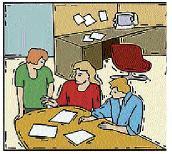Beverley East, Contributor 
IS there such a thing as a successful meeting? If so, what does it take to achieve this?
I am one of those individuals who really loathe meetings. They are time consuming. Back in the day, when I worked for others, it was the one of the things that simply drove me out of my mind. These days, most of my meetings are done by teleconference this is more more expensive, I have become better in my approach to meetings.
It takes a team of people who actively exchange ideas to accomplish the best results. To help ensure success, group members should understand the meeting's purpose.
A lot can be accomplished among people who have a clear sense of direction. Some of the common goals of meetings are: to exchange information, solve problems, arrive at a decision, share concerns, identify and explain issues, and pool each other's knowledge and resources and to arrive at a common objective.
Meetings bring together people with different ideas and experiences. Members have an opportunity and a responsibility to express their thoughts, react to each other's ideas, and combine their skills to find solutions.
It is so important to be clear and to know why your participation in a meeting is important. It is usually because your ideas, comments and suggestions can benefit your organisation or company. Active and positive participation helps to achieve the goals of the meeting, to promote the group's objectives, and to improve team work and morale. Your level of involvement can help you polish and take your communication skills to another level. Meetings allow you to gain experience in expressing yourself diplomatically.
You can learn a great deal by observing and following the examples of successful group leaders.
1. What works is when you come to the meeting prepared. You can help the meeting run so much smoother if you do your homework.
2. Know the purpose of the meeting so you can determine how you can contribute to its success. Delegate the minute-taking to someone who is not only a good listener, but someone who can dicifer what needs to be noted and what can be omitted without losing the sense of the discussion.
3. Review the agenda carefully if available and, if not, get the person in charge or who organised the meeting to send the agenda out earlier, even if it is by email, so you know what will be discussed.
4. Research any available background information before the meeting so you can be a more knowledgeable and a valuable meeting member. Don't just come as a spectator; you may as well not show up.
5. Ask questions before the meeting about anything you don't understand. Questions show your concern for the meeting's success. Understand why you have been invited. You're more likely to participate actively if you know what's expected of you.
6. Practise good meeting manners at all time, which include being punctual.
7. Proper etiquette can help ensure the goals are met according to schedule.
8. It is so important to arrive on time. Latecomers might delay the meeting by creating confusion or breaking the flow of the progress or expecting topics to be repeated. Also when you arrive on time you show respect for the other people's time.
9. Avoid unnecessary interruptions. In most cases, phone calls, message, etc, can wait until the meeting is over. Observe specific time limits; this will allow others a chance to speak and also helps to ensure that all issues on the agenda are covered.
10. Refrain from distractions This includes whispering to your neighbour, doodling, shuffling papers, surfing your blackberry. Stay until the end. It is important follow-up plans are often made during the final minutes of a meeting.
Good communication is a skill worth building; Ideas can be shared more effectively if you keep these basics in mind.
When others speak listen carefully; be courteous, respect opinions, consider suggestions and don't talk over others. Each speaker deserves your full attention. But being attentive isn't just a matter of politeness. Careful listening prevents you from missing valuable information and allows you to take accurate notes.
Treat all members in the same way you'd like them to treat you. Don't interrupt speakers. Never distract others with inappropriate remarks of actions. Everyone has the right to express an opinion. Avoid making hasty judgments of other ideas. Allow others to express their ideas complete before you offer your comments. Don't become defensive when other express ideas that conflict with yours. Instead, use their suggestion to refine and develop you own ideas.
Sometimes it's impossible to cover every item on the agenda. However, avoid hasty decisions that might be regretted later. Instead turn unresolved issues until the next meeting. Follow up assignments. To help guarantee that action is taken on decision, it important to know:
Who is responsible for carrying out the decision?
What is to be done?
How is the action is to be carried out?
When should the work be completed?
A summary of decisions to help refresh the memories of group members, a quick recap of decisions made, and actions to be taken can be helpful. This review can also help prevent confusion later.

